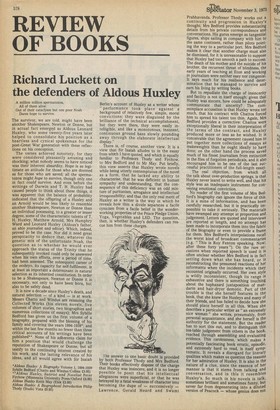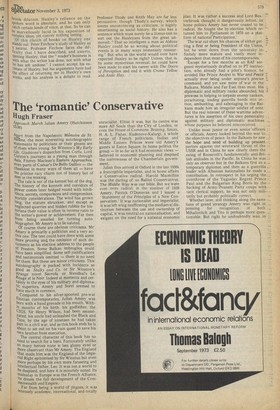5 11,EVIEW
OF BOOKS
Richard Luckett on the defenders of Aldous Huxley
A million million spermatozoa, All of them alive: Out of their cataclysm but one poor Noah Dares hope to survive.
The survivor, we are told, might have been another Shakespeare, Newton or Donne, but in actual fact emerged as Aldous Leonard Huxley, who some twenty-five years later helped to consolidate his position as a heartless and cynical spokesman for the post-Great War generation with these reflections on his conception.
The verses achieved notoriety, for they were considered pleasantly amusing and shocking; what nobody seems to have noticed was their inherent absurdity. Hope is as legi timate an attitude for those who are doomed as for those who are saved; all the sperma
tozoa might hope to survive, though only one in fact could survive, And even before the writings of Darwin and T. H. Huxley had
caused people to think about these things, it was apparent that the balance of probability indicated that the offspring of a Huxley and an Arnold would be less likely to resemble another Shakespeare, Newton or Donne than art individual possessing, to a greater or lesser degree, some of the characteristic talents of T. H. Huxley, Matthew Arnold, Mrs Humphry Ward and Leonard Huxley (Aldous's father, an able journalist and editor). Which, indeed, proved to be the case. Nor did it need great perspicacity to deduce that, whatever the genetic mix of the unfortunate Noah, the question as to whether he would ever approach the status of the Trinity that he subsequently invoked could only be answered when his own efforts, over a period of time, had been assessed. The subsequent career of the embryo, its capacity for self-fulfilment, is at least as important a determinant in natural selection as its inherited constitution. In order to be a Shakespeare, Newton or Donne it is necessary, not only to have been born, but also to be safely dead.
It is now a decade since Huxley's death, and natural selection — of a kind — is at work.
Messrs Chatto and Windus are reissuing the Collected Works (his eleven novels, five volumes of short stories, two biographies and numerous collections of essays); Mrs Sybille Bedford has given us the first volume of a biography, prepared with the blessing of his family and covering the years 1894-1939"; and within the last few months no fewer than three critical accounts of his writings have been published**. None of his adherents claim for him a position that would challenge the reputation of Shakespeare or Donne, but all testify to the continuing interest created by his work, and the lasting relevance of his ideas, and all would agree with Sir Isaiah
"Aldous Huxley: A Biography Volume 1, 1894-1939 Sybille Bedford (Chatto and Windus/Collins £3.95) **Aldous Huxley, Satirist and Novelist Peter Firchow (Minnesota University Press/Oxford £4.00) Aldous Huxley Keith May (Elek £3.80) Aldous Huxley: A Biographical Introduction Philip Thody (Studio Vista E0.95)
Berlin's account of Huxley as a writer whose " performance took place against a background of relatively few, simple, moral convictions; they were disguised by the brilliance of the technical accomplishment, but they were there, they were easily intelligible, and like a monotonous, insistent, continuous ground bass slowly pounding away through the elaborate intellectual display." There is, of course, another view. It is a view that Sir Isaiah alludes to in the essay from which I have quoted, and which is equally familiar to Professors Thody and Firchow, to Mrs Bedford and to Mr May. Put briefly, this view asserts that Huxley wrote novels while being utterly contemptuous of the novel as a form, that he lacked any ability to characterise, that he was deficient in human sympathy and understanding, that the consequence of this deficiency was an odd mixture of puritanism, arrogance and intellectual irresponsibility, and that the only real merit of Huxley as a writer is the way in which he reveals how thin a divide separates a facile cynicism from a facile belief in the wonderworking properties of the Peace Pledge Union, Yoga, Vegetables and LSD. The question, then, is whether Huxley's defenders can rescue him from these charges.
The answer to one basic doubt is provided by both Professor Thody and Mrs Bedford. Their books effectively dispose of the charge that Huxley was insincere, and it is no longer possible to posit that his intellectual allegiances were superficial, or that he was betrayed by a fatal weakness of character into becoming the dupe of — successively — Lawrence, Gerald Heard and Swami
Prabhavanda. Professor Thody works out a continuity and progression in Huxley's
thought; Mrs Bedford provides substantiating details from his private correspondence and conversations. His gurus emerge as tangential figures, ships sailing in company with him to the same continent, rather than pilots pointing the way to a particular port. Mrs Bedford makes it clear that another charge must also be dismissed, for it is unreasonable to suppose that Huxley had too smooth a path to success. The death of his mother and the suicide of his brother, the recurrent threat of blindness, the early years of teaching at Eton and working in journalism were neither easy nor congenial. It says much for his resilience and determination that he managed to survive and earn his living by writing books.
But to repudiate the charge of insincerity and facility is not in itself enough: given that Huxley was sincere, how could he adequately communicate that sincerity? The commonplace accusation is that Huxley wrote too much, that his contract with Chattos forced him to spread his talent too thin. Again, Mrs Bedford provides a corrective: Chattos were exceptionally liberal in their interpretation of the terms of the contract, and Huxley produced more or less as he wished. It is conceivable that the agreement caused him to put together more collections of essays as makeweights than he ought ideally to have done; on the other hand the process saved much of his finest journalism from extinction in the files of forgotten periodicals, and it also encouraged him to be one of the last successful practitioners of the full-length essay.
The real objection, from which all the talk about over-production springs, is that Huxley never learnt to write well, and that his style was an inadequate instrument for conveying emotional conviction. No reader of the first volume of Mrs Bedford's biography can ignore the force of this. It is a mine of information, and has been carefully researched, but it is practically impossible to take it seriously. The materials have swamped any attempt at proportion and judgement. Letters are quoted and interviews are reported at length, and no attempt has been made to incorporate them into the fabric of the biography or even to provide a frame for them. Mrs Bedford's interpolations recall the worst kind of broadcast commentaries (e.g. "This is Roy Fenton speaking. Now; after these forty years "). On the rare occasions when reported speech is used it Is often unclear whether Mrs Bedford is in fact setting down what she has heard, or is reconstructing the presumed reactions of her informants when the incidents which they recounted originally occurred. Her own style is wildly inconsistent, though its range is exhaustive and there is something touching about the haphazard juxtaposition of mandarin and hair-dryer demotic. Part of the trouble is that she herself features in the book, that she knew the Huxleys and many of their friends, and has failed to decide how she should place herself in all this. When she describes a particular writer as "an extremelY nice woman" she writes, presumably, from personal acquaintance, and she herself is the authority for the statement. But the reade.r
has to sort this out, and to distinguish this tea-table judgement from others in the book, reached through assembling and evaluating evidence. This carelessness, which makes a
potentially fascinating book erratic, episodic. and extremely hard to read, is itself symp
tomatic. It reveals a disregard for literary qualities which makes us question the reasons for her admiration of Huxley. It is also in the nature of a clue, since the essence of her manner is that it stems from talking and conversation, and in this it resembles Huxley's. So much in his novels is talk, sometimes brilliant and sometimes funny, but never far from degenerating into a diluted version of Peacock — whose genius does not brook dilution. Huxley's reliance on the Spoken word is absolute, and he can only catch certain kinds of voice, at that. So he can be marvellously lucid in his exposition of Complex ideas, yet convey nothing lasting.
Of this clutch of books on Huxley one stands out: Peter Firchow's study of Huxley as a satirist. Professor Firchow faces the difficulty that 1 have described, and asserts, quoting Huxley, that the " reader's.business is With what the writer has done, not with what he has left undone," I cannot accept his esInnate of Huxley, but his arguments have had the effect of returning me to Huxley's own works, and his analysis is a delight to read. Professor Thody and Keith May are far less persuasive, though Thody's survey, which seems unconvincing as criticism, is highly entertaining as social history. He also has a sentence which must surely be a litmus-test to sort out the Huxleyans from the great unmoved: "That so intelligent a man as Aldous Huxley could be so wrong about political events is in many ways immensely reassuring." But who in the world would ever have expected Huxley to be right? Unless, that is, by some mysterious reversal, .he could have been made to start his career with The Doors of Perception and end it with Crome Yellow and Antic Hay.



































 Previous page
Previous page